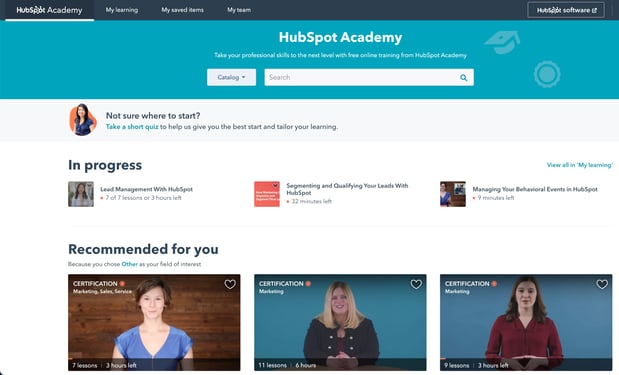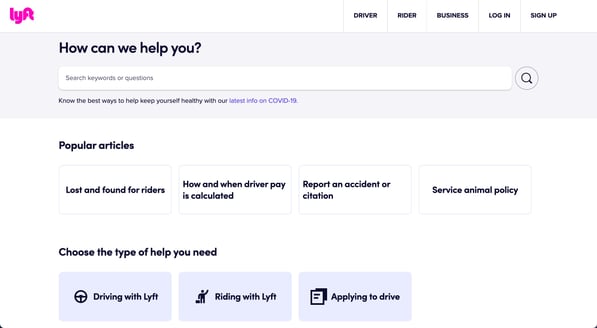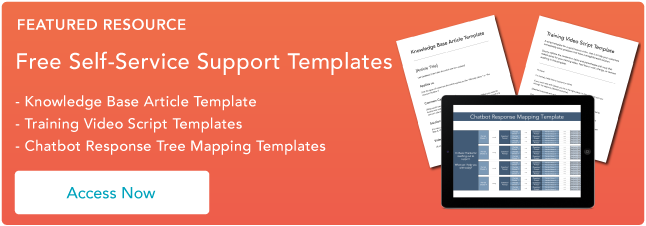More than 69% of consumers prefer to solve issues on their own, and 63% almost always start with a search through a company’s online resources before ever turning to a support rep.

When customers would rather search their questions and get an immediate solution than pick up the phone, you need to speak to their desire, and the best way to do so is through a knowledge base.
Read on to learn more about knowledge bases, why they’re important, and discover high-quality examples that you can use for inspiration. If you already know what you need, jump there with this table of contents:
- Knowledge Base Definition
- Why You Need a Knowledge Base
- What type of data is included in a knowledge base?
- Examples of Knowledge Bases
Knowledge Base Definition
A knowledge base is a centralized database for spreading information and data. Knowledge bases support collecting, organizing, retrieving, and sharing knowledge.
There are two main forms of knowledge bases: machine-readable and human-readable.
Machine-readable knowledge bases store data that can only be analyzed by artificial intelligence systems. These solutions are interpreted and deducted by machines and, thus, are less interactive. Human-readable knowledge bases store documents and physical texts that can be accessed by humans. They are more interactive and hands-on but require time-consuming prompting to gain solutions.
What type of data is included in a knowledge base?
All knowledge bases share valuable information with customers and prospects, but the type of data and information you include in it depends on your business’ purpose for creating one. Common types of data included in a knowledge base are:
- Directions and tips for using your products and services
- Answers to FAQs
- Content you’ve created that can provide in-depth solutions
- Video demonstrations
- Company information
- Knowledge on different business departments
Some businesses also create content that is helpful for general consumers in the industry, not just specific customers. This provides helpful information, and also exposes your content to different audience groups that may end up becoming customers if they benefit from the information you provide.
You can also create an internal knowledge base, where you provide helpful information to your employees, like benefits information, company holidays, etc.
Why You Need a Knowledge Base
1. It's faster for your customers.
People no longer have the patience to flip through dusty encyclopedias in public libraries. They want answers, and they want them now. If a customer or prospect has a specific question about your company -- whether it be "What is artificial intelligence?" or "How do I apply for a job?" -- they'll assume they can simply search that question or similar keywords on your website and be bombarded with tons of answers.
2. It's helpful for your reps.
In addition, your support team can only handle so much. Increasingly, customer support teams have more responsibilities that are separate from directly answering customer questions via phone, email, and live chat. By providing a helpful knowledge base, your customers can get the answers they need on their own. This frees up your support reps to handle more important issues and allows your customers to feel accomplished that they found a solution all by themselves -- after all, consumers expect your business to help them find their own solutions with self-service tools.
3. It's easy to build.
If you can't provide immediate knowledge to your customers, they will turn to a competitor who can. It can be tough to create and manage a knowledge base. However, it can start off easily -- think about the kinds of questions you've had customers ask you in the past and, maybe, the questions you've searched yourself. You can analyze common tickets to determine which issues crop up most frequently that you need to address first. Slowly, your team can build an informative knowledge base that can be a constant resource.
Examples of Knowledge Bases
1. Lyft
Lyft goes above and beyond by providing a knowledge base for both drivers and riders. Rather than just structuring it as a search bar that comes up with keyword-based solutions, Lyft has pre-written brief blog posts that provide valuable advice to both groups, such as "How to change navigation settings,” for drivers, and “Using Google TalkBack to request a ride.” for riders.
Information in the articles is condensed into a few, short paragraphs, making it easy for riders to quickly find the information they need, like how to contact a driver about a missing item, and for busy drivers to save time finding information on the go.
By separating its knowledge base by user demographics, it makes the information all the more accessible and relevant.
2. Canva
Canva’s support page has an aesthetically pleasing, clean-cut layout that makes finding the appropriate tools simple and quick. The landing page features articles based on FAQs, but the best part is that clicking on one overall parent category, say payments, pricing, and billing, leads to additional child categories that help you find a resource as specific to your issue as possible.
The knowledge base also features a search bar where visitors can enter keywords related to their issues and find a solution. Even when conducting their search, the knowledge base makes sure to surface the most relevant and top clicked result first (as shown below), helping users come to quick solutions.

3. HubSpot's Help Center
HubSpot's Help Center provides free tools and training to help businesses and individuals grow. It has a Knowledge Base section that provides tons of knowledge to readers in the form of user guides, quick answer documents, HubSpot user groups, and community discussions.

The HubSpot Help Center also links to HubSpot Academy, where users can find answers to their questions, grow their skills in the areas they’re interested in through videos and classroom training, and get certified in certain topic areas.
Now that you know why you need one, read this next post on how to create a knowledge base.




![How to Create Technical Documentation in 6 Easy Steps [+ Examples]](https://blog.hubspot.com/hubfs/technical documentation_featured.jpg)

![An Easy Guide to Writing Effective Knowledge Base Articles [+ Templates]](https://blog.hubspot.com/hubfs/Knowledge-base-templates.jpg)



![Do Customers More Frequently Use Chat or Phone Support? [HubSpot Data]](https://blog.hubspot.com/hubfs/Google Drive Integration/Do Customers More Frequently Use Chat or Phone Support%3F %5BHubSpot Data%5D-1.png)


